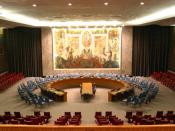The illegal trade in drugs, arms, intellectual property, people, and money is booming. Like the war on terrorism, the fight to control these illicit markets pits governments against agile, stateless, and resourceful networks empowered by globalization. Governments will continue to lose these wars until they adopt new strategies to deal with a larger, unprecedented struggle that now shapes the world as much as confrontations between nation-states once did
The persistence of al Qaeda underscores how hard it is for governments to stamp out stateless, decentralized networks that move freely, quickly, and stealthily across national borders to engage in terror. The intense media coverage devoted to the war on terrorism, however, obscures five other similar global wars that pit governments against agile, well-financed networks of highly dedicated individuals. These are the fights against the illegal international trade in drugs, arms, intellectual property, people, and money. Religious zeal or political goals drive terrorists, but the promise of enormous financial gain motivates those who battle governments in these five wars.
Tragically, profit is no less a motivator for murder, mayhem, and global insecurity than religious fanaticism.
In one form or another, governments have been fighting these five wars for centuries. And losing them. Indeed, thanks to the changes spurred by globalization over the last decade, their losing streak has become even more pronounced. To be sure, nation-states have benefited from the information revolution, stronger political and economic linkages, and the shrinking importance of geographic distance. Unfortunately, criminal networks have benefited even more. Never fettered by the niceties of sovereignty, they are now increasingly free of geographic constraints. Moreover, globalization has not only expanded illegal markets and boosted the size and the resources of criminal networks, it has also imposed more burdens on governments: Tighter public budgets, decentralization, privatization, deregulation, and a more open...


